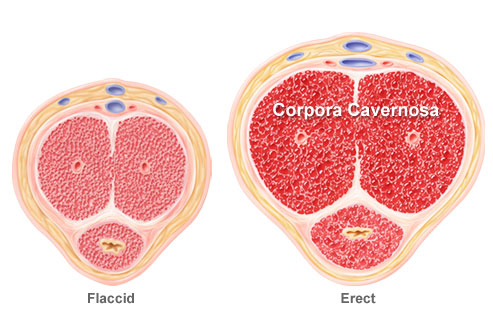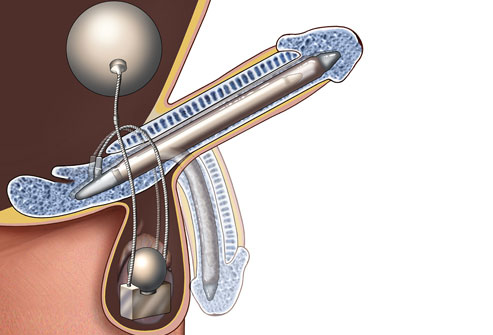What you need to know about erectile dysfunction
Erectile dysfunction in men is a common disease that reduces male function. Men are considered to have erectile dysfunction when they cannot achieve a full erection to satisfy sexual desire. Erectile dysfunction in men has a significant impact on marital life. According to statistics, one in five men will experience this problem and the condition increases with age.

Symptoms of the disease:
– Erectile dysfunction : Is a sexual dysfunction in men that is characterized by the penis not being able to get or maintain enough hardness, making it impossible to enter the vagina during intercourse.
– Erectile dysfunction (impotence) also includes the phenomenon of the penis softening early, before ejaculation; lack of sexual inspiration ; no ejaculation; premature ejaculation; lack or loss of orgasm. Or in other words, the erection of the penis is not enough to complete intercourse.
– Ejaculation disorder : Men when highly excited but cannot ejaculate normally, this is a manifestation of physiological dysfunction , can even lead to no ejaculation. Desire, erection, intercourse, pleasure, ejaculation are a series of instinctive reactions of men. Ejaculation disorder can cause premature ejaculation, no ejaculation or retrograde ejaculation.
– Decreased sexual function : Decreased or lost desire, can be due to abnormal factors such as: mental factors, psychological trauma, stress... are also factors affecting sexual physiology.
– Pain during sex : is a common phenomenon of decreased sexual function, men feel pain during erection, due to stimulation of the glans penis, foreskin, pain during ejaculation, painful urination after ejaculation...
Sexual dysfunction and impotence become more common as men age. The rate of impotence increases from 5% to 15% between the ages of 40 and 70. But this does not mean that your sex life will end as you age. Impotence is more common in people with a history of diabetes, obesity, smoking, and high blood pressure.
An erection occurs when blood fills the corpora cavernosa of the penis. This causes the penis to expand and become stiff, much like a balloon when it is filled with air. This process is triggered by impulses from the brain and sexual nerves. Anything that blocks these impulses or restricts blood flow to the penis can lead to erectile dysfunction.

Causes of erectile dysfunction:
Chronic diseases:
Men with diabetes are two to three times more likely to have erectile dysfunction than men without diabetes. Among men with erectile dysfunction, those with diabetes may develop the problem 10 to 15 years earlier than men without diabetes. However, evidence suggests that good blood sugar control can reduce this risk. Other conditions that can cause erectile dysfunction in men include cardiovascular disease, atherosclerosis (hardening of the arteries), kidney disease, and multiple sclerosis. These conditions can reduce blood flow or nerve impulses in the body.
Lifestyle:
Smoking, drinking too much alcohol, and abusing drugs can damage blood vessels and reduce blood flow to the penis. Smoking makes men with atherosclerosis more likely to have erectile dysfunction. Being overweight and exercising too little also increase the risk. Studies show that men who exercise regularly have a lower risk of developing the disease.
Surgery:
Surgery, including treatment for prostate cancer, bladder cancer, or benign prostatic hyperplasia (BPH), can sometimes damage the nerves and blood vessels near the penis. In some cases, the nerve damage is permanent, and the patient will need treatment to achieve an erection.
Western medicine:
Side effects of medications, including blood pressure medications, antidepressants, and tranquilizers. Men should talk to their doctors if they suspect that a prescription or over-the-counter medication may be causing erectile problems. Never stop taking any medication without first consulting your doctor.
Due to nervous tension, overwork leads to stress :
In today's industrial age, many difficult and complex tasks require concentration of energy and high intelligence to solve the work effectively. This process, if prolonged, will lead to sleep disorders, physiological disorders and loss of sexual desire.
Diagnose:
Several tests can help diagnose male sexual problems. Measuring testosterone levels can determine if there is a hormonal imbalance, which is often the cause of low libido. Blood cell counts, blood sugar levels, cholesterol levels, and liver function tests.
In some cases, erectile dysfunction can be a warning sign of a more serious condition. One study found that erectile dysfunction was a predictor of heart attack, stroke, and death from cardiovascular disease. The researchers say that all men diagnosed with erectile dysfunction should be evaluated for cardiovascular disease. This does not mean that every man with erectile dysfunction will have heart disease, or vice versa, but patients need to be aware of the connection.
Treatment:
Many men with erectile dysfunction can improve their sexual function by making a few lifestyle changes. Quitting smoking, losing weight, and exercising more often can help improve blood flow. If you suspect a medication may increase your risk of erectile dysfunction, talk to your doctor about adjusting your dosage or switching to a different medication.
Oral medication:
You may have heard of Viagra, but it is not the only oral medication for erectile dysfunction. Medications used to treat this condition include: Cialis, Levitra, Staxyn, and Stendra. They all work by improving blood flow to the penis. Take it 30-60 minutes before sexual activity and should not be taken more than once a day (Cialis can be taken up to 36 hours before sexual activity).
Injection:
While oral medications for erectile dysfunction are beneficial, some men maintain stronger erections by injecting the medication directly into the penis. Another option is to insert a pill into the urethra. This medication can trigger an erection within 10 minutes.

Surgery:
If erectile dysfunction is caused by a blockage in the arteries to the penis, surgery can restore blood flow to the penis but is not recommended for older men with narrowed arteries.
Penile implants:
A syringe is implanted into the penis. When the man wants to maintain an erection, a fluid from the syringe is pumped into the penis.
Psychotherapy:
Therapists will help patients and their partners to be less stressed and anxious, become closer and more intimate, and understand each other better in bed.
Alternative therapy:
Using functional foods to improve physiological function is being widely used to improve blood flow to the penis, supplementing hormones naturally without side effects.









